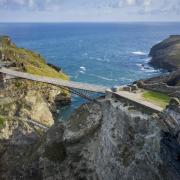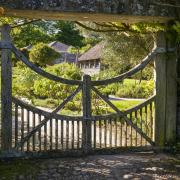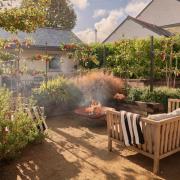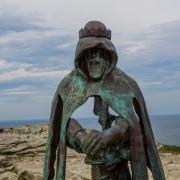As they prepare for their 90th birthday, the outdoor theatre reveals its plans for celebration.
Lynn Batten is responsible for maintenance at the Minack Theatre, a role that entails irregular hours, so she often finds herself alone at the incredible clifftop location in Porthcurno, southwest Cornwall.
“It’s just lovely and silent. You can watch the fishing boats go by, or humpback whales, or dolphins and beautiful sunrises. Just gazing out at sea is the bit I love most,” she says. Given the uniqueness of her job, it’s no surprise Lynn has tales to share, like the time she would’ve sworn she saw Rowena Cade, the founder of the Minack Theatre who passed away in 1983.
“I was working in an area called The Brothers [the name given to two large rocks at the top of the theatre], and I glanced up and thought I saw her walk past. It frightened me to death. I was a kid when she died, so I do remember her, and it did scare me a little bit because she was quite formidable. I just downed tools and left. I thought I’ll clear up in the morning.”

It’s not that far-fetched to believe Rowena’s presence is etched into the Minack as she devoted her life to this one-of-a-kind theatre.
Born in Derbyshire in 1893 to an affluent mill owner, Rowena moved to Cornwall with her mother following her father’s death and had the Minack House built in 1923. Amateur productions were a popular pastime and Rowena discovered she had a knack for design and costume.
She was instrumental in an open-air production of A Midsummer Night’s Dream in the nearby hamlet of Crean in 1929, and when The Tempest was proposed, thoughts turned to a location fit for the storm-laden narrative.
Rowena suggested adapting the space at the bottom of her clifftop garden, amongst the granite boulders, and over the next few months tasked herself with transforming the area with the help of gardener Billy Rawlings and his pal Charles Thomas Angove.

On August 16, 1932, The Tempest opened, and the rough and ready but undeniably magical Minack Theatre was born.
Although the effects of the Second World War undid much of the work, an undeterred Rowena set about not only restoring the theatre, but expanding and refining it, hauling materials from Porthcurno beach, personally inscribing seats and continuing to improve facilities. In fact, she was working on the theatre up until her death at the age of 89, and even then, left detailed plans for how her vision might develop.
The dramatically rural theatre, with its subtropical gardens and carved terraces, continues to do just that with a small but diligent team of staff.
“It’s a great local employer and we’re lucky we’re in full-time roles as there’s always something to do,” says Lynn who describes herself as “the custodian of the site.”
“From November to February, we do all the major work to get the site ready for the season, and I’ll get involved with building sets for any of our own productions, and then after Easter, it’s about maintaining the site, especially filling in the cracks with a bucketful of sand and cement as the concrete is prone to cracking. But nothing is typical about my day. One minute you can be hanging off a ladder, and the next crawling around underneath something. I’m also the theatre’s photographer, but it’s the sort of place where we all pitch in.”
Over the years, she’s heard all sorts from curious visitors. “Some people will ask ‘Where’s the roof?’ or ‘What happens when it rains?’ and we say you get wet.

And someone this year asked whether they had to get out of the car to see the show. But the auditorium comes alive when it’s full of people. It becomes a living theatre rather than just a beautiful place to look at.”
From a practical point of view, there are numerous challenges in staging productions in such an unconventional theatre, not least that sets that have to be carried down, and back up, the steep steps.
“I don’t think Miss Cade ever designed it as a long-term theatre, she just kept adding bits. There are chunks of the stage that are completely useless as the audience can’t see it, so when you’re directing, you have to be really clever in using the space well,” says John Brolly, Minack’s Associate Director.
“It is possible to perform on that stage without any microphones, but you’d have to behave like an Ancient Greek actor looking front only, and using your full projection all the time because if the wind is blowing, and even worse, the sea is rising and falling, the background noise can be enormous,” explains John, a freelance storyteller who directs many of the inhouse productions, runs an extensive educational programme of workshops and events, and has devised specially curated interactive tours.
But he highlights it’s the theatre’s distinctive variables that make it so memorable, and whether the magnificent backdrop enhances or distracts from what’s happening on stage is essentially the actors’ responsibility.

“I think it only distracts if the performers try to soldier on and pretend something’s not happening as they’ll lose the audience. It’s much better that they adapt or interact, whether a beautiful rainbow appears, or the helicopter flies by.”
One of the highlights this season will be a performance of The Tempest, a fortuitous accident as the production was delayed due to the pandemic, but a fitting way to celebrate the 90th anniversary of the Minack’s inaugural performance.
“We’re also hoping to pull together an extra exhibition this year about that first production,” says Zoe Curnow who worked at the theatre as a teen before going onto a career in theatre management and was appointed the Minack’s Executive Director in 2007.
“I’d always looked at the Minack as this two-headed organisation, a tourist attraction that pays homage to its wonderful history, and also a theatre, and I wanted to bring the two together. But whatever reason people visit, they usually leave bowled over because it’s been even better than they expected it to be.”
Undoubtedly, this includes Dr Jill Biden, Carrie Johnson and the other dignitaries who visited the Minack last year during the G7 Summit in Cornwall.
“It was ridiculous, we had three-and-a-half weeks’ notice to produce a bit of theatre, and organise all the logistics, but of course everyone stepped up and it went brilliantly, and Porthcurno looked perfect,” recalls Zoe.
One memory that sticks in her mind is the reaction of the American drivers who were doing a recce of the local roads ahead of Dr Jill’s visit when Zoe invited them to see the theatre.
“They said we never get asked to come in anywhere and that was fabulous. We gave them the same tour we gave the important people on the day, but then, of course they should see it. And it doesn’t matter who it is, that first view of the theatre always prompts the same reaction.”

The Minack’s now one of the county’s must-see attractions, but that wasn’t always the case.
“People presume it’s always been really successful, but Rowena Cade struggled financially trying to keep the place going and it’s fair to say she was close to giving up at times, but she kept going and in 1976 the charity was founded, and it ticked over. But it’s the Internet that really raised its profile when people began sharing pictures,” remarks Zoe who’s excited to see the Minack continue to evolve.
“We’ve been in a position commercially where we’ve generated sufficient surpluses to be in a healthy place as a charity, so we’ve been able to invest more in our educational work with young people, giving them that confidence and taste of theatre, produce our own work, and expand the quality of the events for audiences. I feel very privileged to steer things at such a wonderful place, and hopefully leave it in strong position for future generations to enjoy.”
For more info, visit The Minack Theatre




























